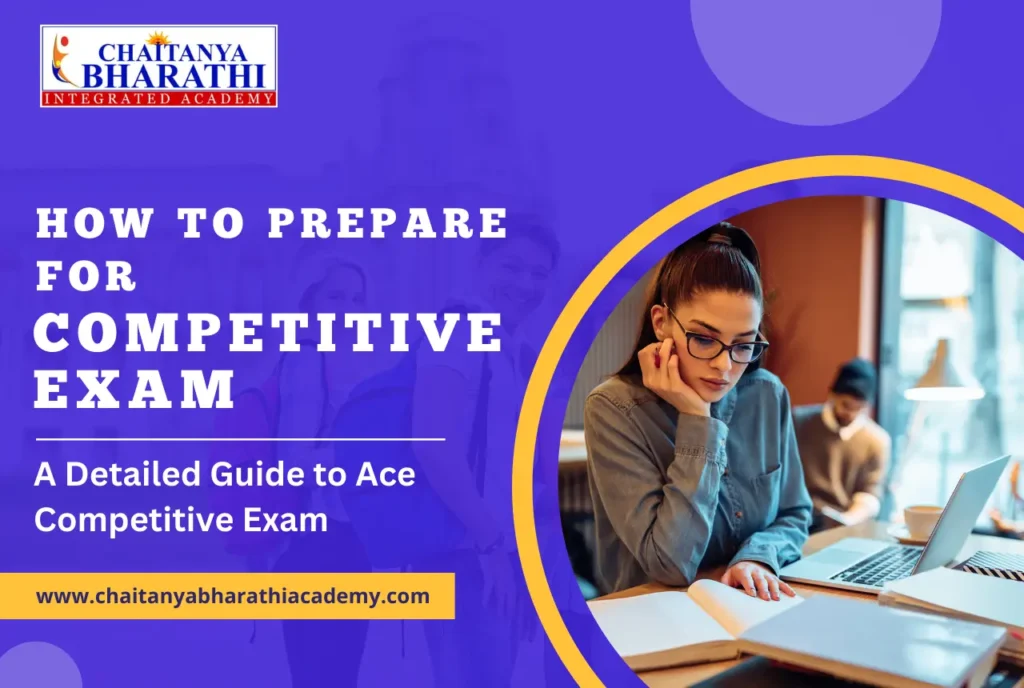How to prepare for competitive exams is a popular question among students as it acts as a gateway to coveted opportunities in various fields. In India, there are multiple arrays of competitive exams ranging from securing a seat in the most prestigious medical schools to landing a dream job in the Indian Civil Service, all of these exams are designed to assess a registered candidate’s skills, knowledge, and aptitude (most importantly). Nationwide for multiple candidates, competitive exams have been shaping career trajectories by playing a crucial role in ensuring access to specialized and important fields.
Although possible, however, the path toward success in competitive exams is rarely smooth. That’s why knowing how to prepare for competitive exams is necessary, as students often face many challenges during their preparation. Some of them are the vast amount of syllabus, the pressure to perform under constraints, and the huge mental strain of dealing with fierce competition that always takes a toll on the aspirants. In addition to these issues, other problems like the lack of a strategic study approach have and could lead to wastage of time, and inefficient learning, ultimately leading to disappointment.
This is the point at which a well-organized study plan is essential. Students are guided and their possibilities of success are maximized by it serving as a roadmap. Students can approach the exam with confidence and optimize their preparation by organizing study sessions, prioritizing topics, and incorporating various learning techniques.
This blog guide is written in a comprehensive way that delves into the intricacies of how to prepare for competitive exams. We will investigate effective strategies, time management techniques, and valuable resources to provide you with the knowledge and tools necessary to succeed on any competitive exam. Exam anxiety can be transformed into exam mastery through the application of a well-crafted plan, perseverance, and dedication.
How to Prepare for Competitive Exam: A Step-by-Step Guide
1. Understand the Exam
It is always advised to have a strategic approach if one is trying to ace a competitive exam. Always properly understand the exam and its pattern as it is crucial to know it before diving into the content and syllabus for the same. To understand the exam try to know the format, syllabus, and weightage of the different sections and how they are rationed in preference to the exam conducted for years. Hence, it is understood that familiarizing yourself with the types of questions (MCQs, essays, etc) the total marks that are allotted, and the passing requirements, in inclusion of the time limit associated with each section to be attempted or even completed.
Every competitive exam has its dedicated website that could easily give you the gist of all the materials and information necessary to understand and know the exam you are about to attempt. And let us get this straight solving previous year’s questions and mock tests has exponentially enhanced the quality and skills of the aspirants in cracking the competitive exams.
2. Create a Personalized Study Plan

Prepare a well-structured study plan which will always come in handy acting as the backbone for your exam preparations. It enables the assurance of being able to cover the entire syllabus effectively by allocating focus based on your strengths and weaknesses.
Initiate your preparations by analyzing your strengths and weaknesses in each of the subjects needed as the basis of the exam. Always try allocating more and increased time that would be essential to tackle your weaker areas while strategically revising the subjects or sections you are strong in. This is where creating a proper schedule becomes the key to success. Appropriately dissect and divide your study time into dedicated sloths for each/topic, which will ensure consistency and focus during your preparations.
There is something called the SMART goal framework, try incorporating this technique into your study frame for exemplary and excellent results. What is the SMART goal framework, you ask?
SMART stands for Specific, Measurable, Achievable, Relevant, and Time-bound. This is the technique to allocate practical and achievable targets within your timetable. For example instead of a vague goal like “study more,” a SMART goal might be “complete 2 chapters of history by the end of the week.” This clarity keeps you motivated and on track.
3. Gather the Right Resources
Get prepared to stay ahead of the curve by surrounding yourself with high-quality study materials. It is seen that textbooks recommended by the board of exams are always a great starting point. If you supplement these with different reference books that are written and known for their clear explanations and extensive comprehensive coverage you can gain rhythm exponentially. In addition to these materials if you have access to coaching materials that apply to the exam, then it can offer valuable insights and practice questions.
Don’t underestimate the power of online resources. Educational websites and platforms offer video lectures, topic-wise explanations, and practice tests. Utilize previous years’ question papers and mock tests to gauge your understanding, identify knowledge gaps, and practice time management under exam-like conditions.
4. Develop Effective Study Techniques

There’s no one-size-fits-all approach to studying. Experiment with different techniques to find what works best for you. Here are some effective methods to consider:
- Active reading: Engage with the material by highlighting key points, taking notes, and summarizing what you’ve learned.
- Spaced repetition: Revisit concepts at spaced intervals to solidify them in your long-term memory. Flashcards are a great tool for this.
- Mind maps: Visually organize information using diagrams with central topics branching out to subtopics and details.
- Mnemonics: Use memory aids like acronyms or rhymes to remember complex information.
- Practice problems: Regularly solve past exam questions and practice problems from your study materials. This not only tests your knowledge but also builds problem-solving skills.
10 Tips for Successful Competitive Exam Preparation

A strategic and comprehensive approach is necessary to succeed in a competitive exam. The following are ten indispensable suggestions to establish a foundation for success:
Tip 1: Master the Art of Time Management
Master time and you master all – that’s the notion one must follow religiously so that they can score the best in their competitive exams. Time management is the cornerstone of effective and sustainable exam preparation. Build and craft a daily schedule that suits your capacities, by allocating specific time slots for each subject or topic. Stay realistic and practical about what you think you can achieve in a day by prioritizing challenging topics during the peak focus hours. Try minimizing distraction by silencing your cell phone, finding a comfortable and quiet study space, and especially informing others of your dedicated study time.
Tip 2: Build a Strong Foundation
While understanding how to prepare for competitive exams a solid grasp of fundamental concepts is crucial before tackling complex subjects. Be patient with the basics. Ensure you grasp core principles before taking the next step of advanced learning. One can simply achieve this by regularly revising previously learned material that could solidify your knowledge and identify areas that might further attention and more importance than the basics.
Tip 3: Focus on Active Learning
You can enhance your effectiveness by employing active learning techniques, such as simple re-reading of text, which can be more effective than any form of passive learning technique. Active learning when followed properly can engage your mind and strengthen memory. One can do it by summarizing concepts in their own words, explaining notions to friends, or even by creating practice problems that could test your understanding and give you an edge ahead of others.
Tip 4: Make Notes that Work for You

Suppose you can use an effective way of note-taking that personalizes your study materials and especially aids in revision. Try developing a clear and concise way of taking notes that will suit your learning style. In addition to these one can explore techniques like the Cornell Method, which will allocate space for summaries, keywords, and additional notes, or different ways of using mind maps that visually organize information.
Tip 5: Practice with Previous Years’ Papers and Mock Tests
We have understood across the blog that using previous years’ question papers and mock tests are tools that are beyond value, cause these tend to offer several benefits when one starts using and practicing them. As they are part of the main exams, it exponentially helps you gain a deeper & better understanding of the format of the exam, what are the different types of questions that are typically asked, and even the weightage given to various topics. To identify your weaknesses and areas needing improvement, analyze your performance by attempting mocks which will help you extensively. If you are regularly practicing with tests that are timed it will also enhance your time management skills and boost your confidence when you go to attempt the exam.
Tip 6: Take Regular Breaks and Maintain a Healthy Lifestyle

To safeguard yourself from burnout avoid marathon study sessions. As advised before make a schedule of short breaks every hour to make sure you have a refreshed mind that could help you maintain focus. Get up, move around, stretch, or do some light breathing exercises. Always keep this in mind – a healthy body fuels a healthy mind. Consume nutritious meals, prioritize quality sleep, and engage in consistent physical activity. Your cognitive function and capacity to learn and retain information will be enhanced by a physically fit and well-rested body.
Tip 7: Stay Motivated Throughout Your Preparation
The path to exam success can be lengthy. It is essential to maintain motivation. Establish achievable, short-term objectives and incentivize yourself to accomplish them. Support your endeavor by surrounding yourself with positive influences. When motivation is low, remind yourself of your objectives and envision your success.
Tip 8: Manage Exam Anxiety Effectively

Every aspirant appearing for competitive exams goes through the phase of exam anxiety, this is a common experience among everyone. So, how does one overcome it? It is easy to master it by learning techniques that make you efficient in managing anxiety. Let us look into some of them – Practicing relaxation techniques like –
- Deep Breathing Exercises
- Meditation
- Positive Self-Affirmations
A combination of these can be really helpful, over these always remind yourself of your preparation and capabilities. Keep your focus on what you can control, this will equip you to become well-prepared and will boost your approach towards the exam with a clear mind.
Tip 9: Seek Help When Needed
Do not hesitate to request assistance. Consult with mentors, teachers, or online forums that specialize in the examination to resolve any uncertainties. An assisting hand can remove obstacles and advance you.
Tip 10: Believe in Yourself and Stay Positive
A positive outlook and unwavering self-assurance are potent instruments. Visualize yourself succeeding and have confidence in your preparation. This mental fortitude will enable you to perform at your best and approach the exam with confidence.
Conclusion
Achieve success in competitive exams by devising a strategic approach! Primary emphasis should be placed on the development of a robust foundation through the complete understanding of fundamental concepts. Frequent revision is necessary to fortify one’s understanding. Engage with the material by utilizing high-quality resources and practice problems. Attempt practice exams to enhance confidence and identify areas of weakness. It is crucial to prioritize a healthful lifestyle to achieve optimal brainpower. Maintain a positive attitude and set achievable objectives to maintain motivation. Utilise self-assurance and relaxation strategies to alleviate exam anxiety. Please bear in mind that assistance is perpetually accessible. Customize these strategies to your distinctive learning manner and dominate your exams!












